Talk to a Registered Dietitian and use INSIDER20 for 20% off!
Talk to a real Dietitian for only $99: Schedule Now
This post contains links through which we may earn a small commission should you make a purchase from a brand. This in no way affects our ability to objectively critique the products and brands we review.
Evidence Based Research To fulfill our commitment to bringing our audience accurate and insightful content, our expert writers and medical reviewers rely on carefully curated research.
Read Our Editorial Policy
The building blocks of this. The building blocks of that.
While we’re as appreciative as the next person for “layperson-ese,” reducing essential amino acids like L-lysine to this one-sentence definition (building block of protein) hand-waves away its many other research-supported benefits.
Yes, L-lysine helps build proteins, but research is continuing to uncover and confirm more benefits, including anxiety management, inflammation control, and much more.
In this guide to all things L-lysine, we’ll explain the health benefits of L-lysine, where you can find it, and how best to take advantage of it.
L-lysine is an amino acid—a type of molecule that combines with others of the same category to form proteins, but with several other applications in this case.
To avoid confusion, L-lysine is very similar to “regular lysine” on the molecular level, but not the same; think of the isomer L-lysine as a very close variant that is further down the family tree, with lysine at the top.
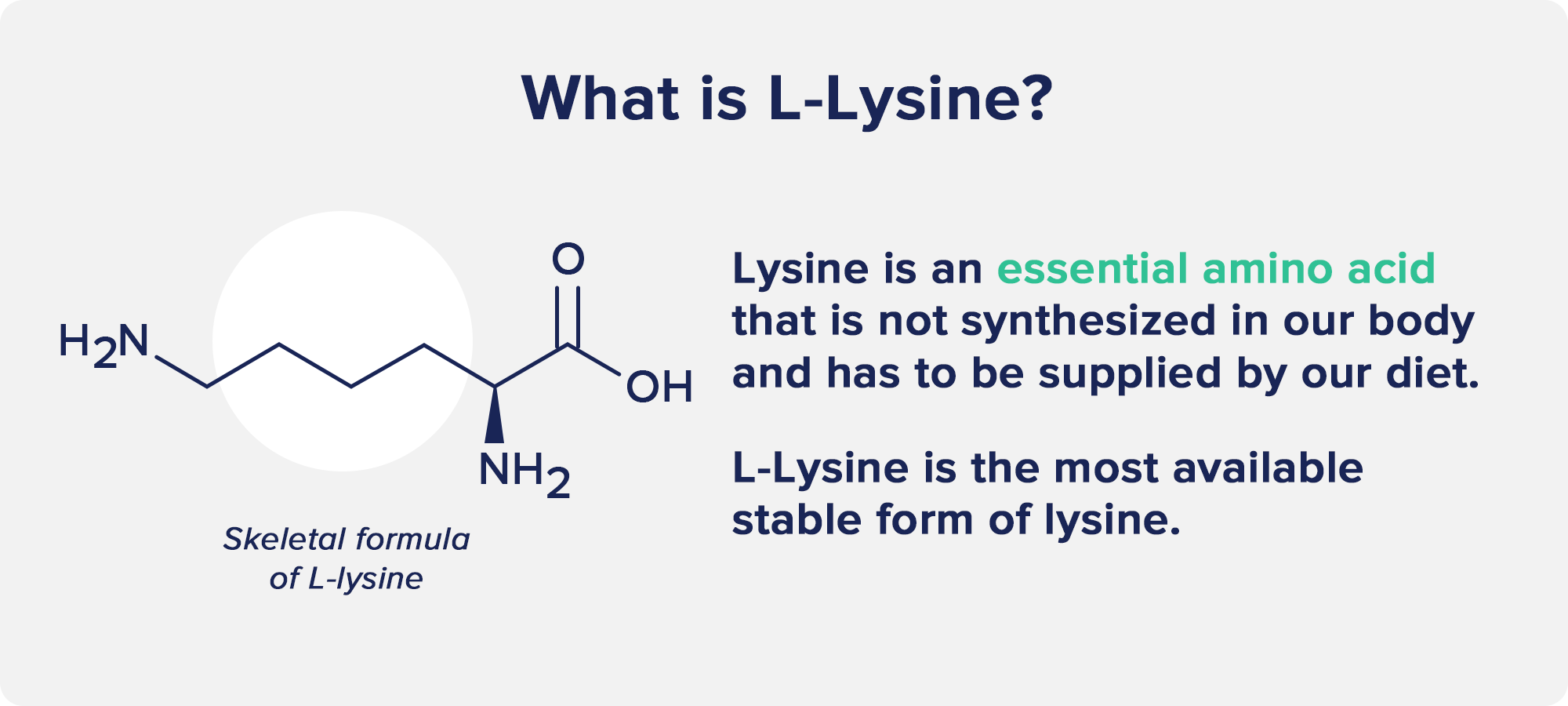
Because they are so similar in structure and function, we’ll use lysine and L-lysine interchangeably (as some researchers do when commenting on their effects), but keep in mind there are very subtle differences.
It’s also important to know that lysine is an essential amino acid, meaning our bodies can’t function properly without it.
This essential-ness is made more so by the fact that our bodies cannot produce lysine; it is an “exogenous” (“outside + producing”) nutrient that we must derive from food or supplements.
As an amino acid, L-lysine is mostly found in protein-rich foods, though not all protein-rich foods provide a significant amount of it.
Here’s a quick list of some of the most popular foods that pack plenty of lysine:
Today, the majority of people derive enough lysine from the top three items alone (let’s be real—meat and cheese), and protein-conscious meat abstainers can still keep up.
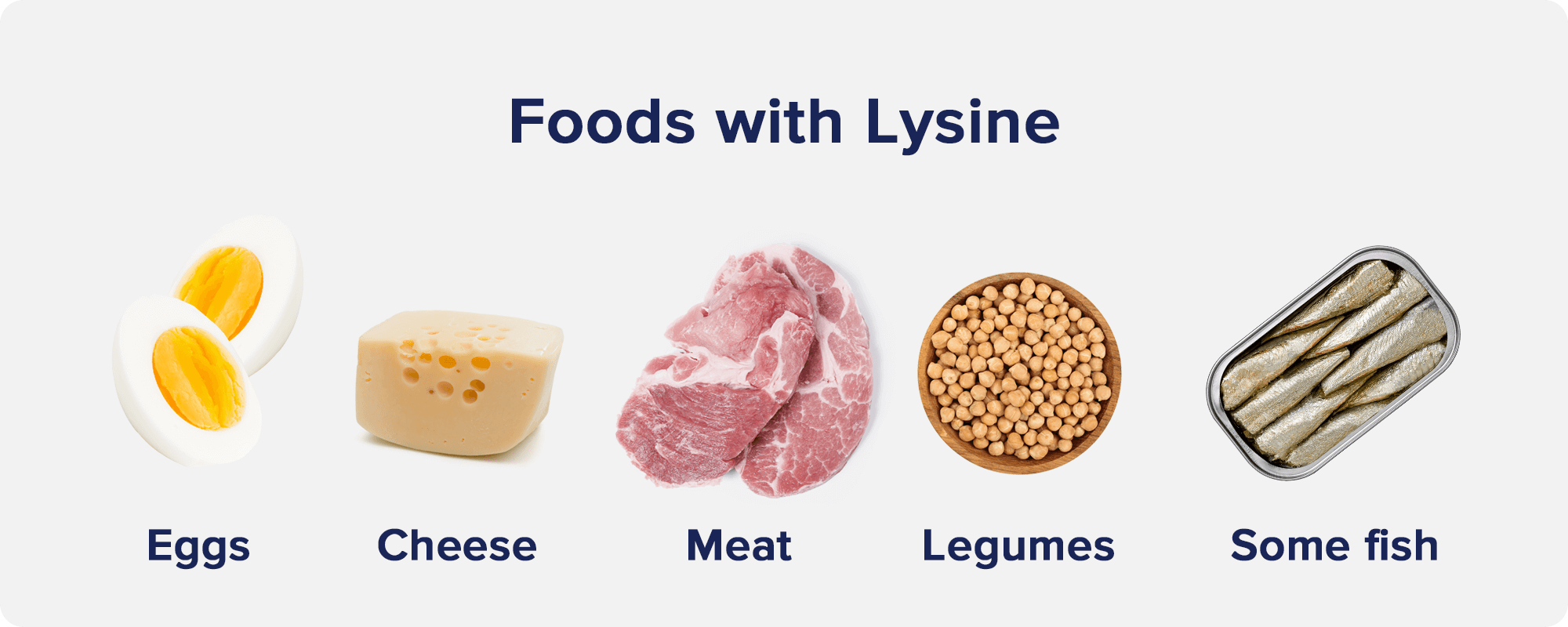
In fact, there are plenty of plant-based lysine sources out there, like avocados, tomatoes, potatoes, chickpeas, and more.
Still, if you do fall behind, or if you simply prefer a supplement for the consistency and/or assurance, there are plenty of L-Lysine supplements available from top-quality brands like NOW Foods.
Though you can find L-lysine in capsules, topical products, and liquid form, capsules are the most common.
We’ll get more into the evidence behind L-lysine benefits below, but to provide a broader overview, L-lysine is essential for proper growth, fat metabolism (so, energy and weight management), inflammation management, calcium absorption, collagen formation, and more.
Most of the research on L-lysine today centers around these mechanisms and the many potential benefits and drawbacks that come with them, but there are some more nuanced and specific case studies coming to light as well.
For example, L-lysine may help treat and/or prevent herpes simplex virus, and has shown promise as an anxiolytic, or an agent that reduces anxiety.
Symptoms of deficiency also help clinician researchers to outline the processes that L-lysine is involved in, though many of them are too general to point to specific mechanisms. Here’s a short list of some of the most common L-lysine deficiency symptoms:
As promised, here’s a survey of just some of the more recently trekked avenues relating to L-lysine benefits.
A study authored by agricultural and nutrition researchers from the Institute of Life Sciences in Japan found that, after fortifying the wheat-based food supply of a poor Syrian community with lysine, both male and female participants demonstrated reduced stress responses.
Honing in on the boogeyman of stress hormones—cortisol—the researchers observed that lysine fortification reduced acute cortisol responses (they used a blood draw as the stressor).
Using a kind of survey called the “trait anxiety inventory,” the study also found that males noted a reduction in chronic anxiety symptoms over time.
Importantly, the study authors also noted that the stress-reducing effects of lysine “were observed only in a subgroup with high baseline anxiety,” i.e., there was no sedative effect on those who had normal levels of anxiety.
As for the mechanism, it gets more than a bit technical, but we’ll just say the experimenters believed that lysine’s antagonistic actions at a stress-promoting cell receptor called 5-HT4 was the key driver of stress-reducing effects.
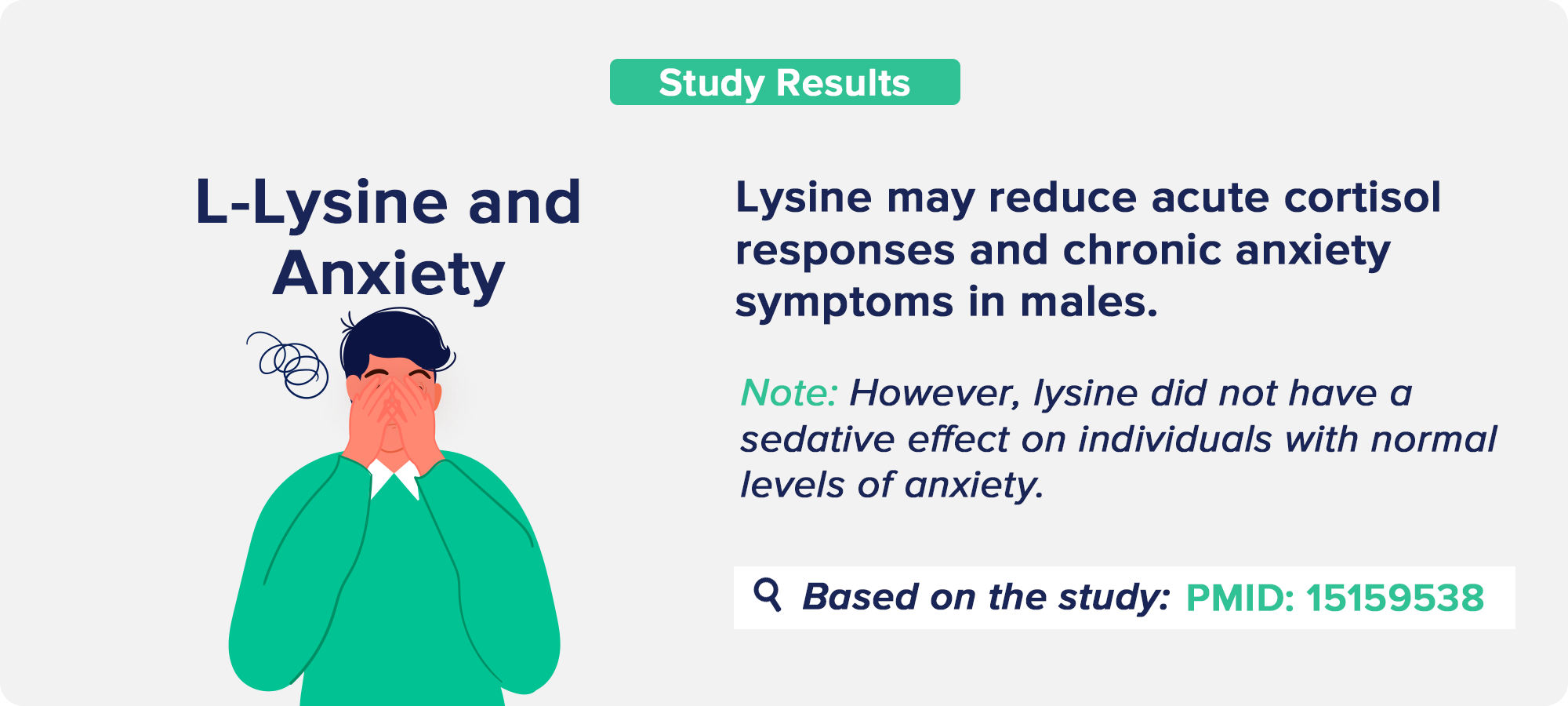
A study from the College of Basic and Applied Sciences in Ghana showed that lysine supplementation reduced the mean systolic blood pressure of hypertensive participants by approximately 17 mmHg among men and roughly 12 mmHg among women.
The control group saw very little difference in blood pressure over the 112-day study period, strengthening the case for lysine as a means to potently and safely reduce blood pressure.
To clarify, this participant group of 180 people in total was identified as having a suboptimal lysine intake, so it isn’t clear from this study how lysine impacts the blood pressure of those without a deficiency.
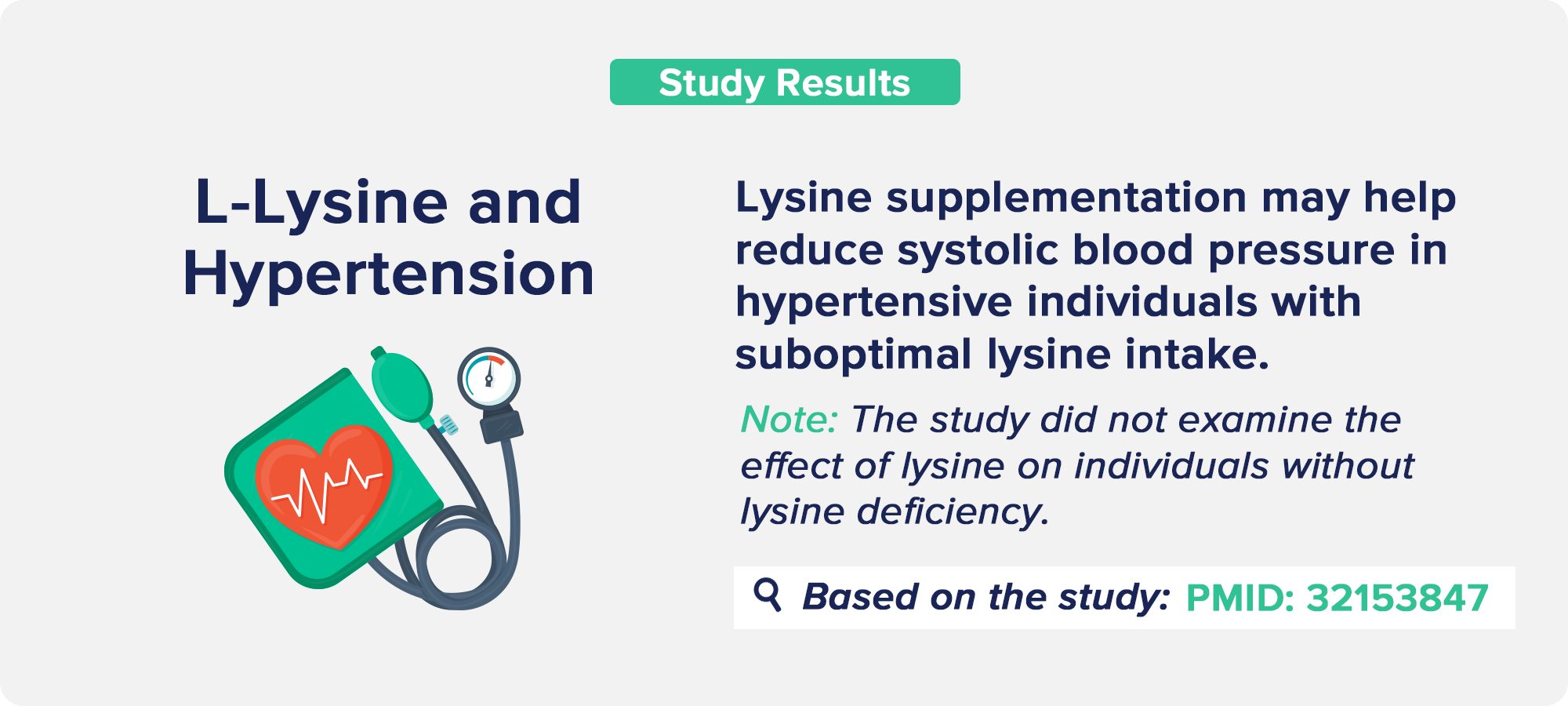
Both forms of the herpes simplex virus (orally [HSV-1] and sexually transmitted [HSV-2]) are said by numerous studies to be ameliorated in one or more ways by lysine supplementation.
For example, participants in this study from Indiana University School of Medicine demonstrated fewer and less severe HSV infections, with an added improvement in healing time.
Another review reflects the subjective side of these benefits, showing that at least 3 grams of L-lysine supplementation per day improved patients’ self-reported comfort and symptoms.
Many scientists studying HSV believe that the vast majority of the adult population (we’re talking 90% or more) actually have the virus, which remains dormant until immune issues and/or stress trigger a flare-up.
The second review in mention echoes the idea that the “lysine-arginine balance” may be behind these flare-ups, or at least a strong contributing factor.
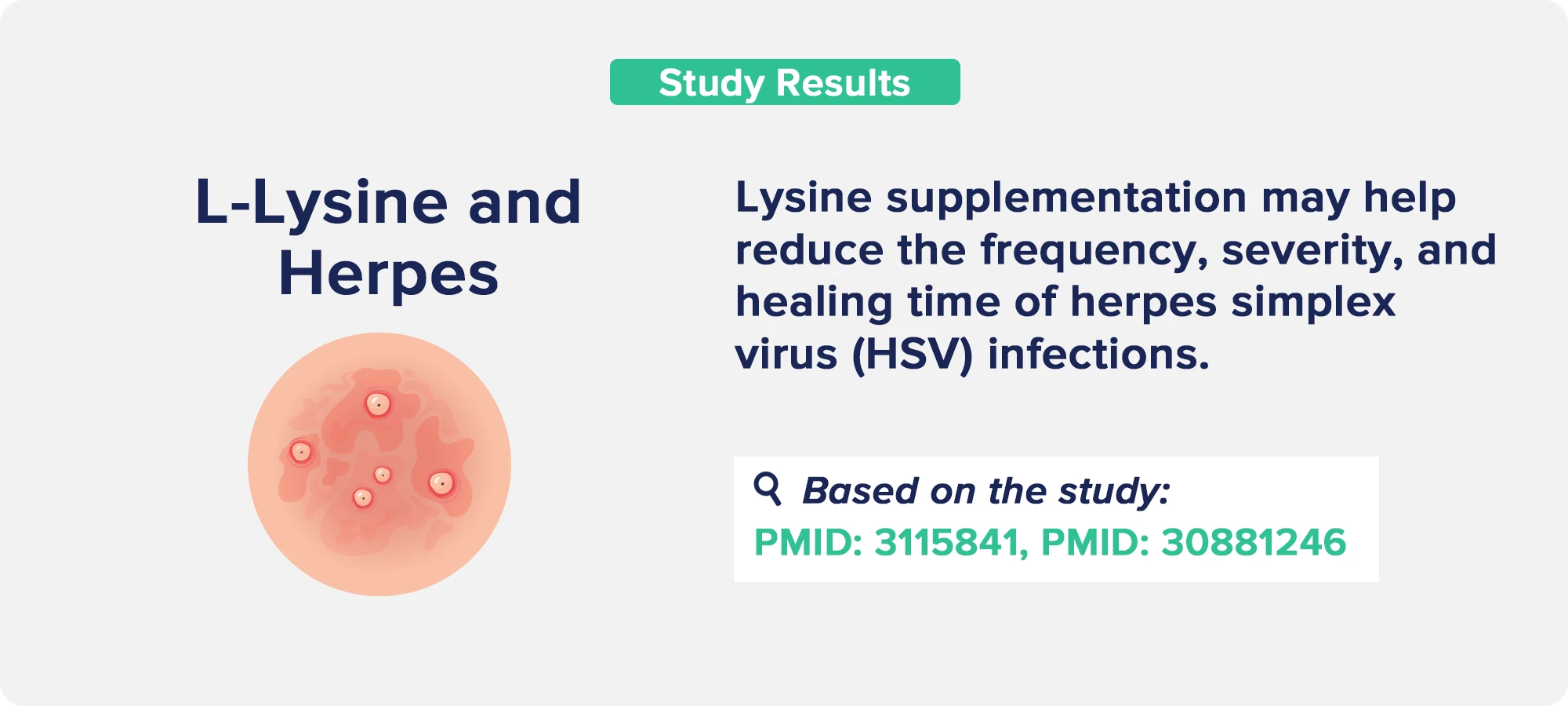
While lysine only comprises around 3 or 4% of the amino acid profile of collagen, this article from a biochemical research group in Saint-Etienne, France explains that lysine has “An important function in the constitution of the cross-links between the molecules to build the fibrils and the fibers of collagen.”
In other words, when it comes to the formation of the coveted protein that is collagen, lysine is more of a “clutch player” than a workhorse, but vital just the same.
It’s not just collagen, either, but protein synthesis in general that suffers without lysine. This study from Mississippi State University determined that dietary lysine restriction in pigs produced a clear drop in protein synthesis and a reduced “gain-to-feed ratio.”
In other words, if the lysine-deficient pigs had any bodybuilding aspirations, they would have had to work much harder at it than their fellow swine because they were less efficient in their ability to build proteins from the (other) nutrients in their diet.
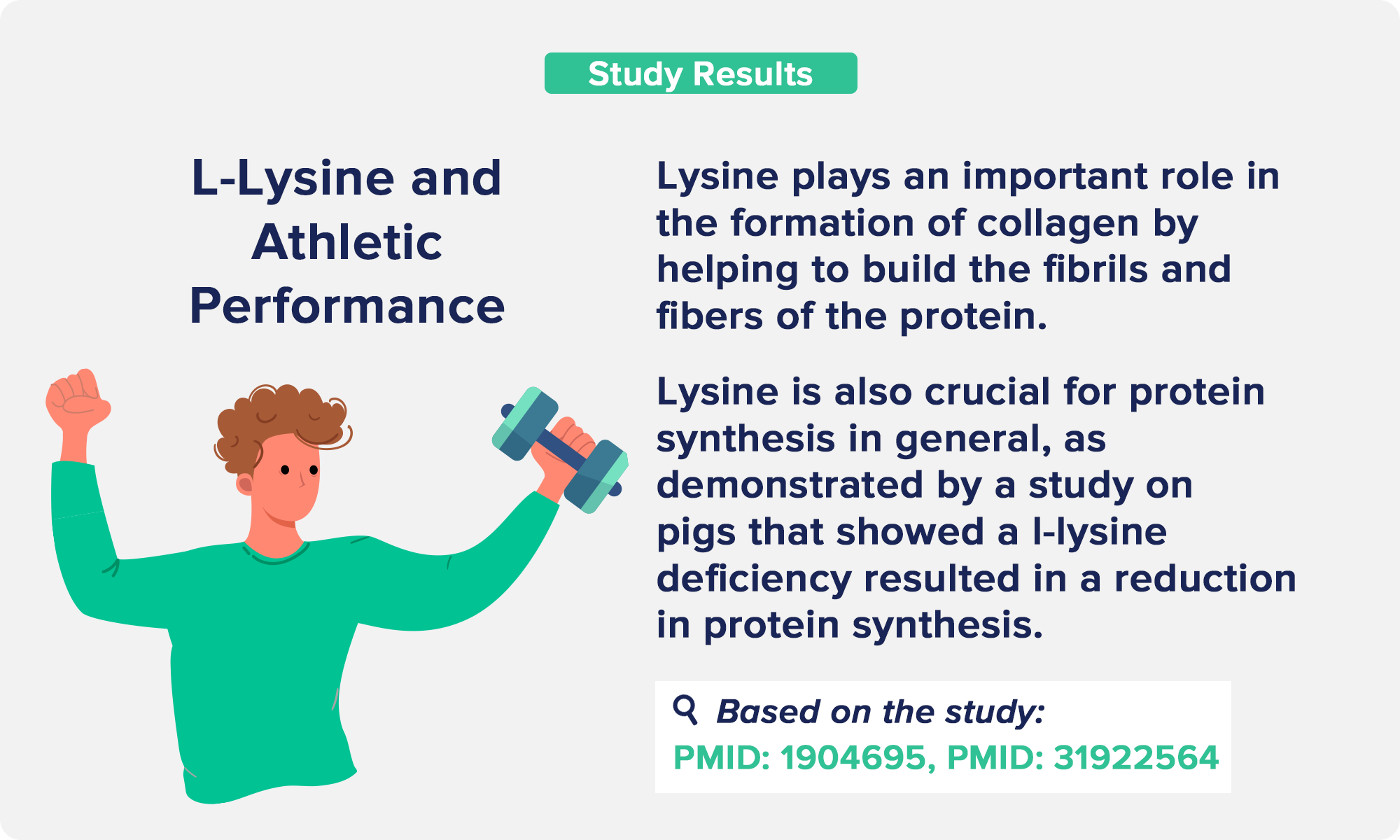
In addition to helping the body absorb calcium more efficiently, researchers from the Institute of Medical Pathology at the University of Siena (Italy) suggested that L-lysine can “improve the renal (kidney) conservation of the absorbed calcium.”
To support this point, they note a case in which L-lysine-treated participants in a separate study demonstrated an increase in the amount of calcium in the bloodstream, but a “blunted calciuric response to the calcium load,” meaning less calcium than expected was passed through the urine.
Down the line of increased calcium absorption is the expectation of increased bone density, though correlation is admittedly diminished with age.
Still, this study from the University of East Anglia in the UK found that amino acid intake (including lysine, among five others they explicitly mentioned) was associated with “higher BMD (bone mineral density) at the spine and forearm,” though leucine beat lysine for potency here.
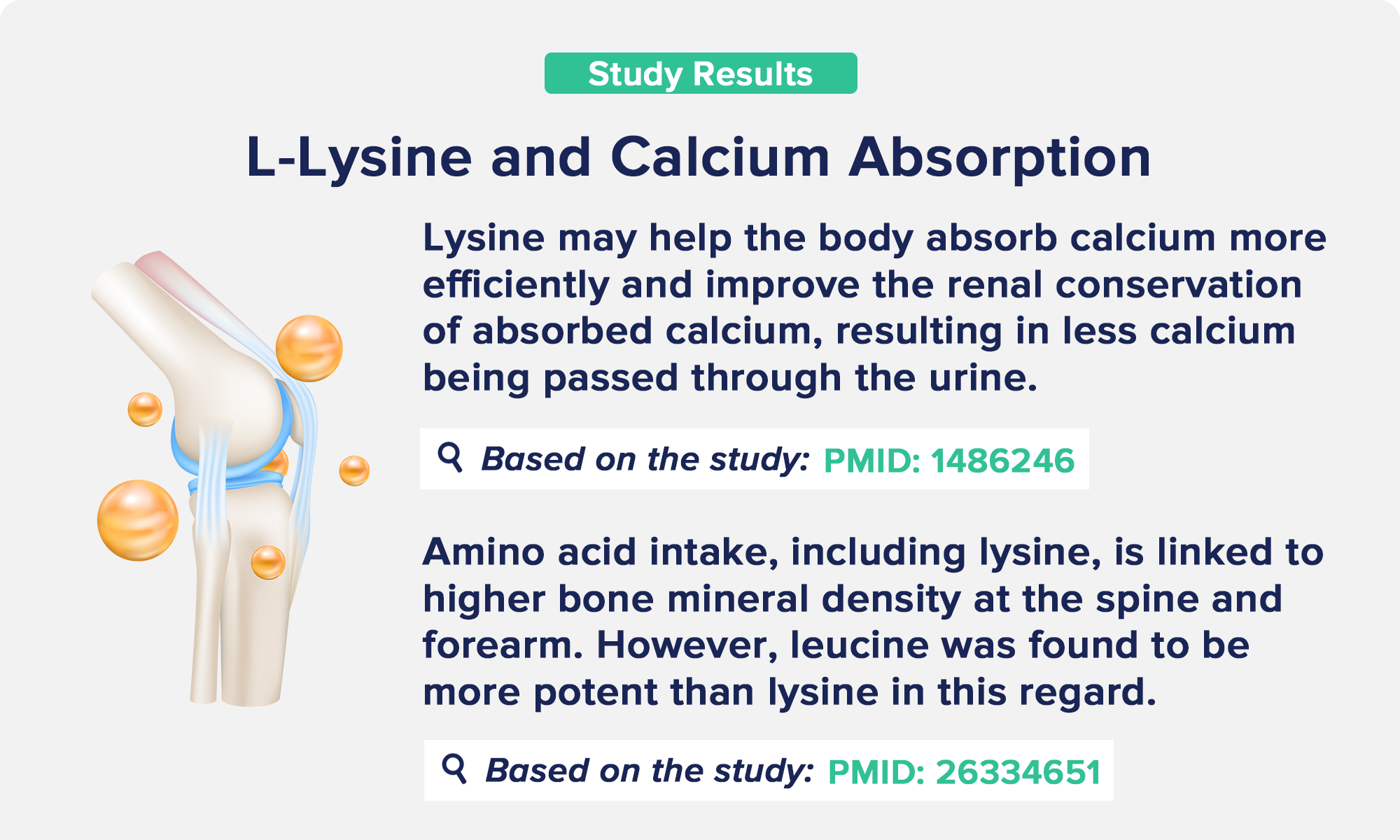
As a naturally occuring amino acid, L-lysine is generally very well tolerated, but of course, nothing is without potential side effects.
This Mount Sinai guide to lysine lists some potential issues associated with the amino acid, which can be exacerbated by concurrent calcium supplementation, certain health conditions, and more.
Some antibiotics, Mount Sinai warns, may increase the risk of nephrotoxicity (nephrons are the functional unit of the kidney) when combined with lysine supplementation. Gallstones and renal dysfunction have also been linked to excessive lysine consumption in some cases.
Other side effects include diarrhea, nausea, and cramps, to name a few.
Considering L-lysine is abundant throughout meat- and plant-based foods, it’s not something most people need to actively seek out or avoid unless there’s an issue.
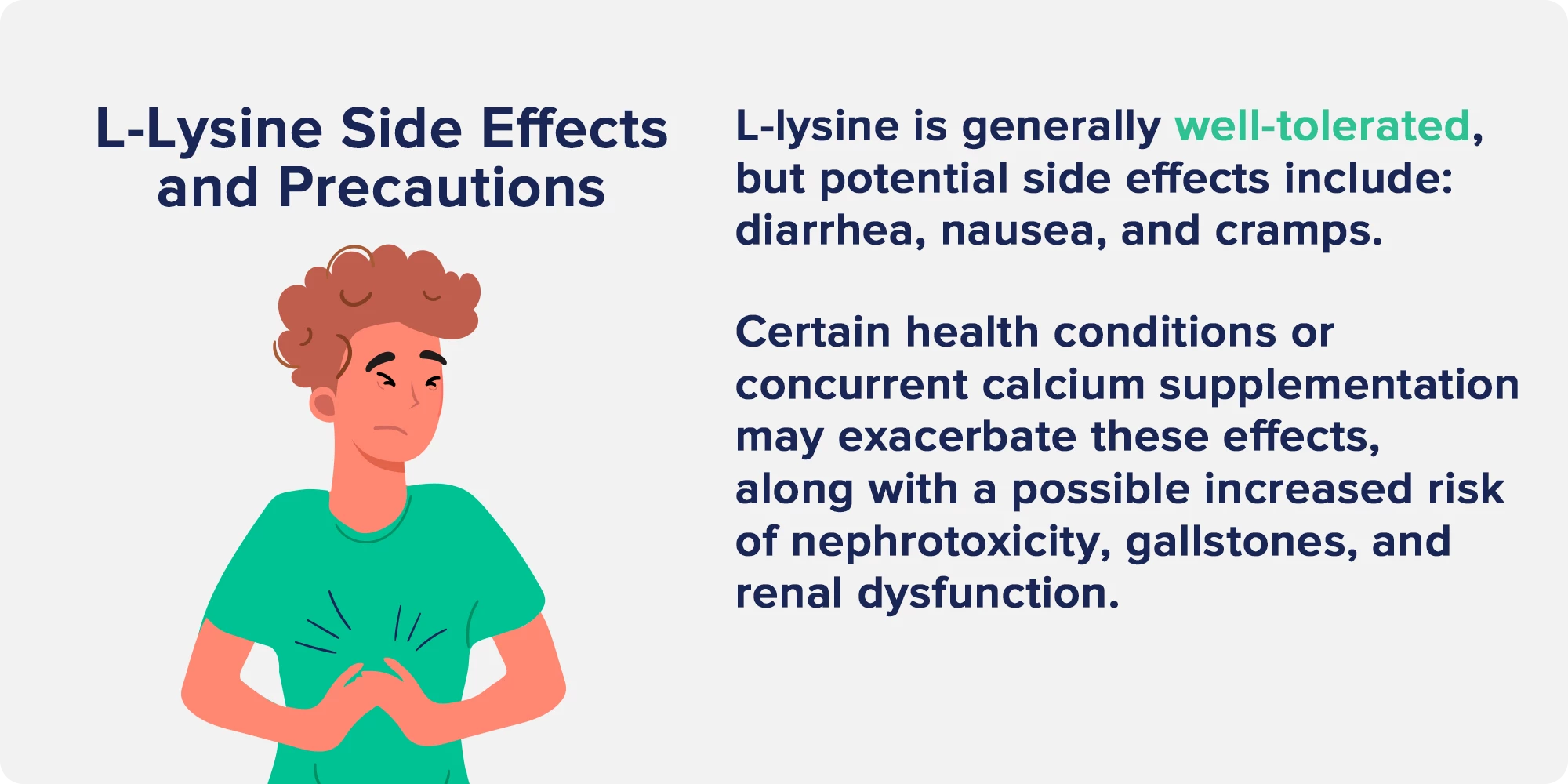
The answer depends on the amount you’re taking, how much you’re already getting from food, whether or not you take drugs that can interact with L-lysine, and any other health factors that may affect your response to the supplement.
Assuming none of the above factors cause an issue with L-lysine supplementation in your case, most sources recommend a range of around 30-60 mg per kg of body weight per day.
For a 68 kg (150 lbs) person, then, this range is roughly from 2,100 to 4,200 mg a day.
If you’re using L-lysine to treat a cold sore(s), it will generally take between 24-48 hours to completely resolve the issue.
If you’re using L-lysine to aid in muscle development, it depends on several factors, but generally, it could take between 4-8 weeks before you notice any results.
The mechanism involved is still being explored, but researchers are now fairly confident that L-lysine has anti-inflammatory properties.
This study from the Department of Neurosurgery at Wuhan University (China) demonstrated that L-lysine reduces the inflammatory response to intracerebral hemorrhage in mice.
More research (with human participants) is needed to explore more L-lysine benefits for brain health and other anti-inflammatory applications L-lysine has, if any.
Lysine is a proven treatment for herpes simplex virus, as mentioned above.
Interestingly, some studies have suggested that lysine can also block infection in SARS-CoV-2 and influenza, but this vein of research needs more support.
Anyone with kidney disease or other kidney-related issues, as well as people with lysinuric protein intolerance, should consult with a healthcare provider before taking a lysine supplement or medication.
Data on whether or not lysine passes through breast milk and its effect on unborn or nursing babies is poor, so it is recommended that pregnant and breastfeeding mothers do not use lysine.
Certain antibiotics may interact with lysine, and if you’re already taking large amounts of calcium, you may also want to consult with a doctor before considering lysine, as it raises calcium absorption in the body.
L-lysine is an essential, exogenous amino acid found in meat, eggs, cheese, and fruits and vegetables as well. You can also find it in supplement form.
Some of the most concretely understood benefits of this amino acid include muscle development, collagen production, herpes simplex virus treatment, calcium absorption, and blood pressure regulation.
Lysine is very well tolerated at levels of up to roughly 4,000 mg or more a day for adults (depending on body weight), but it can interact with some medications and cause kidney issues, among other problems.